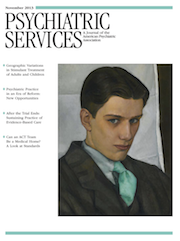A Comparison of Assertive Community Treatment Fidelity Measures and Patient-Centered Medical Home Standards
Abstract
Objective
This study compared program measures of assertive community treatment (ACT) with standards of accreditation for the patient-centered medical home (PCMH) to determine whether there were similarities in the infrastructure of the two methods of service delivery and whether high-fidelity ACT teams would qualify for medical home accreditation.
Methods
The authors compared National Committee for Quality Assurance PCMH standards with two ACT fidelity measures (the Dartmouth Assertive Community Treatment Scale and the Tool for Measurement of Assertive Community Treatment [TMACT]) and with national ACT program standards.
Results
PCMH standards pertaining to enhanced access and continuity, management of care, and self-care support demonstrated strong overlap across ACT measures. Standards for identification and management of populations, care coordination and follow-up, and quality improvement demonstrated less overlap. The TMACT and the program standards had sufficient overlap to score in the range of a level 1 PCMH, but no ACT measure sufficiently detailed methods of population-based screening and tracking of referrals to satisfy “must-pass” elements of the standards.
Conclusions
ACT measures and medical home standards had significant overlap in innate infrastructure. ACT teams following the program standards or undergoing TMACT fidelity review could have the necessary infrastructure to serve as medical homes if they were properly equipped to supervise general medical care and administer activities to improve management of chronic diseases.



